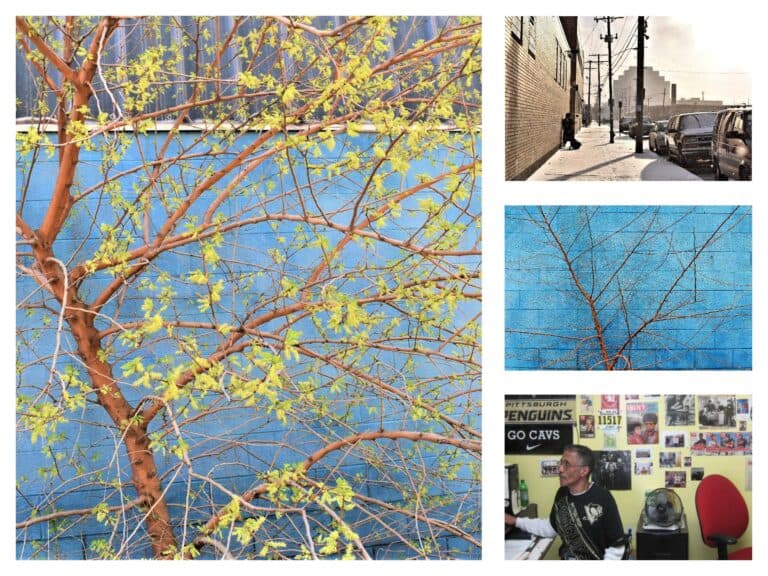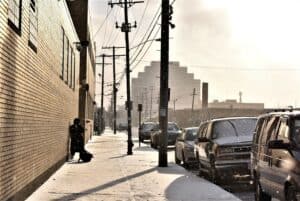Bill Walker

Bill oversees the Emergency Dorm for those who are new to the shelter or want nothing to do with getting connected to services. It’s fair to say that, out of all the residents in the shelter, these are the individuals who have the least trust in any other human being, let alone those in authority. But, Bill has this way of starting a conversation. His office walls are plastered with images. “A client who was very withdrawn saw a picture on my office wall of the rock group Big Brother and the Holding Company with Janis Joplin. Not only did he name all the members of the band but also what instruments they played. We started out talking about music and gradually ended up talking about housing. That was about 8 years ago, and he is still housed.”
There’s another thing about Bill: he’s got this deadpan humor that helps in what can be such serious work. Bill tells an amusing story: “Years ago a client was not happy with the work I was doing on his behalf. He felt I did not have the educational tools needed and wrote up a grievance stressing my ignorance. Funny part was he came back to my office a few minutes later and asked me how to spell “incompetent” and “nonchalant.” Bill’s scrappy humor also comes out in how he loves wearing a Pittsburgh Steelers or Penguins shirt here in Cleveland. “The best defense is an offense,” he says. This is a great analogy for how some people cope with homeless…hard exterior to guard their vulnerable situation.
These days, Bill has this level-headed demeanor. Listening to him, I sense a slow transformation of character. From the streets to his days at the Jay Hotel when Jim Schlect, in his Catholic Worker ethos, talked about “becoming a better human being.” And more transformation when Bill’s future wife, Kathy, goaded him into a better life choice. Then Bill actually started being complimented by residents who witnessed a change in him. Bill credits the current shelter director, Michael Sering, as the primary influence on his character. Bill describes Michael’s attitude as “Always making things a little bit better by analyzing what’s going on in the building, in the client’s life, and in the Continuum of Care. If I have a goal, it’s to make things a little bit better…including myself.”
Survival
 Having been homeless, a door has opened for me to know what homelessness is actually like. It is something you have to experience to realize the trauma, the abuse, the self-abuse that people go through when they are indeed homeless. Your main job is to survive. The stress of figuring out where you’re going to stay tonight never ends. Imagine the trauma after months of this.
Having been homeless, a door has opened for me to know what homelessness is actually like. It is something you have to experience to realize the trauma, the abuse, the self-abuse that people go through when they are indeed homeless. Your main job is to survive. The stress of figuring out where you’re going to stay tonight never ends. Imagine the trauma after months of this.
Why was I homeless? Perfect storm. A little bit of alcohol, a few Quaaludes, undiagnosed mental health disorders, anger issues while at Edinboro University. I didn’t graduate. Left Pennsylvania and went to Texas, a place I’d been before. No goal except to get away from my problems. I called it “getting a fresh start.” But a friend who encouraged me to stay and seek help in Pennsylvania later told me she thought I was on a suicide mission.
When I arrived in Texas I had money in my pocket, I worked jobs, but my inability to cope caused me to lose jobs too. Had a few skirmishes with law. I ended up in a psych unit at a hospital. I became homeless, living on the streets. And it did not take long for me to develop the street mentality of survival mode.
In the homeless community it’s “What church serves the best food? Where do I get the best clothes? Watch out for that group over there because they are crazy and violent.” You have your own way of coping, how to handle yourself. The best way for me was to stay clear of the shelters. I stayed outside. Worked occasional jobs. I kept my fitness by running and lifting, believe it or not. I bathed in the library, bathed in the water fountains outside late at night. For me that was normal life after a while.
Houston, Texas was a violent city in the 70’s. At that time the other large cities in Texas emptied their mental institutions. People were given bag lunches and one-way tickets to Houston. The temp services thrived, the blood banks thrived. The people who were homeless did not prosper.
The True Nightmare
 I saw a man who was homeless run out in the street and pick up a pigeon that was hit by a car. He began to eat the pigeon while the pigeon was still alive. In that snapshot moment, I realized how badly some people who roam the street need mental health services. Another time I was in a position to see a street girl killed. I was almost killed by the same person.
I saw a man who was homeless run out in the street and pick up a pigeon that was hit by a car. He began to eat the pigeon while the pigeon was still alive. In that snapshot moment, I realized how badly some people who roam the street need mental health services. Another time I was in a position to see a street girl killed. I was almost killed by the same person.
I saw countless people spend their last pennies on drugs and alcohol, then go sleep in cardboard boxes. I knew people who kept pictures of loved ones wrapped in baggies in their coat pockets…coats falling off their backs. I saw well-off college students drive by homeless sites at night and throw water balloons and coins, just for the hell of it.
While this was going on, people started becoming ill in the late 70’s and early 80’s. We did not realize the AIDS virus was beginning to spread. No doctors were coming to see us. People were dying on the streets. I’m fortunate to have lived through it – many I cared about did not.
To say I always had hope would be a lie. To say I was willing to make necessary changes in my life would also be a lie. I re-invented myself in order to survive, to become “more”…more brutal, more street-wise, more heartless, more likely to hurt someone than to be hurt by someone, more unforgiving, more thoughtless, more cruel – more ashamed and embarrassed than anything else, even if I could never say it out loud.
At a staff meeting Bill mentioned he’s not a scared type of person but, “When I have nightmares that cause me to jump out of my sleep, I dream that I’m homeless again. That’s the true nightmare.”
Moving On
Eventually, I came back North. Had a little money to see a girlfriend in Youngstown. We decided not to marry, and I walked to the RTA, asked the clerk what’s the next bus. He said “Cleveland and Chicago.” I said, “Well, I hate Chicago, and I really don’t like Cleveland, but I’ll go to Cleveland.” I stayed at Salvation Army, 1985-1986 and worked at a dive called the Jay Hotel on Cleveland’s Near West side.
I thought I knew about drug addiction until I worked at the Jay. Seeing up-close-and-personal the rise of crack cocaine was an eye-opener because I’d never seen a drug take hold of a person like that. I’d been around a lot of heroin users in my day, although I was not a heroin user. But crack seemed to just take over a person’s soul – heart and soul – taking everything out of them. In Cleveland at least, crack rose up in the mid to late 80’s. It was a big change, people running all night long, sweating, just out of their mind over this drug.
Planting a seed
 At that time, I also met Jim Schlecht and Duane Drotar who worked for Money and Mailboxes, a forerunner of Mental Health Services. They both had Catholic Worker roots. Their ethos was to be especially there with people on the street. At the Jay Hotel, Jim told me some round about things about people “changing their lifestyles, becoming better human beings.” I’m looking at Jim like he’s crazy. Even though he was talking about a client at the Jay, he was looking straight at me, so I kind of got the message he was talking about me. I did not forget that.
At that time, I also met Jim Schlecht and Duane Drotar who worked for Money and Mailboxes, a forerunner of Mental Health Services. They both had Catholic Worker roots. Their ethos was to be especially there with people on the street. At the Jay Hotel, Jim told me some round about things about people “changing their lifestyles, becoming better human beings.” I’m looking at Jim like he’s crazy. Even though he was talking about a client at the Jay, he was looking straight at me, so I kind of got the message he was talking about me. I did not forget that.
I also met my future wife, Kathy around that time. She kind of instilled the same thought in me about becoming a better person. Later, she goaded me into working for Salvation Army, the precursor of LMM’s 2100. It was called “2100 Jump Street” back then. I was opposed to working there, but Kathy said “This is your chance to step up. If you want to be a better person, this is one way to do it.”
Kathy thought working for Salvation Army would appeal to me from my experiences working at the Jay Hotel where I knew almost every person who was homeless on the West side. Eventually I went to Salvation Army headquarters and applied for the job. I could tell the people at headquarters were actually a little afraid to be onsite at 2100. That was a little bit of an eye opener.
2100 Jump Street
When I came on staff, I already knew the shelter director, Angelo Anderson, who had been on the streets selling the Homeless Grapevine newspaper. I knew probably 80% of the clients using the building, so it was kind of okay after a minute. What was really an improvement was the fact that clients who had known me as “not such a nice person” witnessed first-hand that I was trying to make changes in my life. They’re complimenting me. And I found myself complimenting some of them about the changes they were trying to make. “Character building,” I guess you’d call it, became important to me.
“2100 Jump Street” was rocking and rolling down here. There were no metal detectors, nine out of ten times we were shorthanded. Those of us on staff had the experience to better handle this because we’d already made connections with the people. We understood.
Growing Understanding…I think I can help a little
 These days, I don’t look at people like objects. To the outside person, someone who’s homeless might appear greedy or self-indulgent for using the drugs or alcohol. I want to say a fair amount of that is coping mechanisms because of extreme trauma. After a point, some people have just given up on themselves. They maybe go to treatment and don’t do so well. They go to treatment again – don’t do well. I try not to be so judgmental. I remember when I was out on the street when self-improvement was easier said than done.
These days, I don’t look at people like objects. To the outside person, someone who’s homeless might appear greedy or self-indulgent for using the drugs or alcohol. I want to say a fair amount of that is coping mechanisms because of extreme trauma. After a point, some people have just given up on themselves. They maybe go to treatment and don’t do so well. They go to treatment again – don’t do well. I try not to be so judgmental. I remember when I was out on the street when self-improvement was easier said than done.
We are seeing the tip of the iceberg of what a person is going through. For people who are homeless the world is threatening. If they go to a drop-in center like the Bishop Cosgrove Center around the block, there could be people over there looking to hurt them, maybe they owe them money. There’s a lot of things that go on in their lives. From my experience of being that person out on the street, I think can help a little bit.
Staff trainings
I also try to remember, what I think may be good for a person may not be what that person wants for themselves. Sometimes I have to step back from the equation because not everyone wants to be in a house, or have that, or do this. People are different and have different goals and dreams. We’re trained as staff in “motivational interviewing,” a social service term. It’s about moving a person from a place of ambivalence to making some decisions in their life. But these choices have to come from them. When a person has a problem, we ask, “What are we going to do about it – or not?” The “or no”’ is up to them. For me, personally, it’s hard not to be judgmental. I’m wanting to say, “Why can’t you get this right?” But I also remember when I was on the street. It’s a lot easier said than done.
(Motivational Interviewing is a collaborative, goal-oriented style of communication designed to strengthen personal motivation in an atmosphere of acceptance and compassion.)
I’ve also done trainings about those with sexually oriented offenses and the barriers they face once released from jail. Let’s face it, they’re not necessarily a sympathetic group of individuals, but they’re human beings. They’re a part of our population and still deserve our attention and help in housing, employment, and other services.
Young people with no where to go
I’m using what I’ve learned about youth who are homeless from being at the Jay back in the 80’s. There I was exposed to LMM’s youth reentry program. What I began to understand then, and see plainly now, is a lot of youth come out of abusive situations. Some age out of foster care. Some have no parental mentoring and are self-taught. Most have zero life-skills. Almost all of them are looking for a place where they belong. Wanting to belong to something. Some join gangs and some get lost in their Internet universe. It is also why some lose the ability to care.
The current director of the shelter, Mike Sering, has taught me something too. We have mission statements but the thing I learned from Mike Sering is to always try to make things a little better. I’ve watched how he works and what he brings. If you stop trying to make things better, you’re not doing your job – that’s probably my best training. If I have a goal as a staff person it’s to make things just a little better. Now I try to help others…that thing called “character” I am calling my own. Every now and then, I fall back. I have anger issues that sometimes come to the surface. So, making things a little better includes me. I have to check myself.
Training for the Trauma
Trauma informed care is a mainstay of staff training. I have a person in my dorm. Everyone complains about him, specifically about his hygiene. He doesn’t bath or wash clothes. I had a conversation with him and took a hard stance, walking him to the shower. Then I saw the fear all over his face. It was really striking. I rethought my approach and instead had a conversation with him. I asked if he’d like to stick around in the morning and help me clean the dorm with a few others. He said he’d like to. It’s how Jim Schlecht talked to me back at the Jay Hotel. Then I mentioned that I like my volunteers and workers to be as clean as the areas they’re cleaning. He was the one to bring up his hygiene and opened up. His parents and step-parents would punish him by holding him in a shower and abusing him. Once again, it’s the trauma.
He said he’d try his best to shower two or three times a week, but I’m not holding him to that. If he doesn’t, that would be an understandable thing. He has a therapist and a counselor from a different organization but I also want him to talk with someone on our staff to work through this. In the meantime, I think I’m helping. But I also know there’s a point in the conversation where his troubles are above my pay grade. That’s when I make a referral.
Burned in My Memory
When we’re working in here, we just hope we can make someone’s life a little better. Knowing we can’t house everybody, we can’t help everybody, but we can be there to support. I will tell the guys in my dorm, “I can’t prevent you from going under if I don’t know you’re drowning. You have to communicate. At least open the door a crack where I have the opportunity to help.”
Maybe you’ve come out of homelessness and you go on living your life. Maybe you have a job, a spouse, a home, a car. Still, homelessness will be burned into your memory. Being on staff, I understand the things clients go through on a daily basis that they don’t talk to us about and that we don’t know. But because I’ve been out there, I know.


